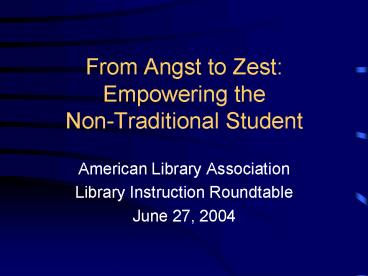From Angst to Zest: Empowering the Non-Traditional Student - PowerPoint PPT Presentation
1 / 32
Title:
From Angst to Zest: Empowering the Non-Traditional Student
Description:
... Learning Internal changes that occur in our consciousness ... Typology of Adult Education Formal Non Formal Informal (or self directed) (Coombs ... – PowerPoint PPT presentation
Number of Views:175
Avg rating:3.0/5.0
Title: From Angst to Zest: Empowering the Non-Traditional Student
1
From Angst to Zest Empowering the
Non-Traditional Student
- American Library Association
- Library Instruction Roundtable
- June 27, 2004
2
- Angst
- Feeling of anxiety
- or apprehension
- often accompanied
- by depression
- Zest
- Spirited enjoyment gusto keen, hearty pleasure
or appreciation
3
The Goal
- Helping returning adults to get from feeling
anxious and apprehensive about being a student to
enjoying and appreciating the experience
4
Typical Non-Traditional Student
- Over 25
- Part time
- Commuter
- Adult responsibilities
- Often female
- Increasingly person of color or immigrant
5
Returning
- Returning to school after time off - Irene
- Returning to the workforce - Angie
- Returning to interaction with others - Claire
6
Useful Life of Knowledge
80
Lifespan
30
40
50
70
25
Social change
Ancient Rome
21st Century
Renaissance
20th Century
18th-19th Centuries
7
Definition - Learning
- Internal changes that occur in our consciousness
- Acquisition of knowledge, skill, or attitudes
8
Definition - Education
- Those activities, events and conditions that
encourage learning, whether deliberate or
unintentional. - (Apps)
9
Purposes of Adult Education
- 1. Grow and develop
- 2. Solve practical problems
- 3. Increase work opportunities
- 4. Meet organizational needs
- 5. Examine community society issues
- (Caffarella)
10
Typology of Adult Education
- Formal
- Non Formal
- Informal (or self directed)
- (Coombs, Prosser, Ahmed)
11
Learner Decides
What to Learn How to Learn
Formal No No
Non-Formal Yes No
Informal Yes Yes
- (Mocker and Spear, 1982)
12
Theory of Andragogy
- Art and science of
- helping adults learn
- (Lindemann, Knowles)
13
Andragogical Assumptions
- Dependence Self direction
- Experience Experience
- Developmental tasks Readiness
- Future Immediate application
- Intrinsic and extrinsic motivation
14
Andragogical Model
- Diagnose learning needs
- Formulate objectives
- Design pattern of learning experiences
- Evaluate results
15
Implications for Practice
- Adults must be involved in their own learning
- Adults bring life experience and want to utilize
and build upon it - Adults want to have some choice in the direction
of their own learning - Adults want to be able to apply what they are
learning to real life situations
16
Grows Staged Self-Directed Learning Model
- HIGH willing and able
MODERATE willing but unable
INTERMEDIATE - willing and somewhat able
LOW lack motivation and knowledge
17
Theory of Margin - ML/P
- Margin of Life Load divided by Power
- Load family, work, community responsibilities
(ext.) and aspirations, desires, expectations
(int.) - Power ability, , skills, support
- Need available margin to engage in learning
- (McClusky)
18
Sources of Angst
- Situational
- Cost (includes child care)
- Time constraints too busy
- Lack of course relevance
- Personal problems lack of a support system
19
Sources of Angst
- Dispositional
- Lack of confidence lack of voice
- Lack of personal priority lack of interest
20
More Angst
- Also correlate with
- Socio Economic Status
- Pre-adulthood experiences
- Parents educational experience
21
Summing It Up
- Like title of Sharon Drapers book, a lot of
non-traditional students feel - Not quite burned out, but crispy around the edges
22
Stages of Development
- Biological
- Psychological
- Cognitive
- Socio-cultural
23
Impact of Aging
- Adults 25-45 learn at nearly same rate and same
manner as they would at 20 - Performance tasks deteriorate verbal tasks do not
24
Biological Aging
- Loss of close vision and hearing
- Declining reaction time (fewer, lighter brain
cells) - Disease loss of mobility, pain, fatigue
25
Senior Adults
- Some decline in functioning between 60 and early
70s - Few studies of healthy adults beyond 70
- Test results differ if factor of speed is removed
26
Multiple Intelligences
27
Sociocultural Factors
- Social roles and timing of life events
- Socially constructed notions of race, gender,
ethnicity, and sexual orientation
28
Social Roles
- Parent
- Spouse
- Worker
- Child
- Friend
- Role changes call for new skills
- Roles and age define appropriate behavior
29
Typical Learning Styles
- Euro-American
- Field independent
- Analytical (parts to whole)
- Non-affective
- Abstract contextually sterile problem solving
- Non-Western
- Field dependent
- Relational and holistic (whole to parts)
- Affective
- Contextually rich problem solving
30
Implications for Practice
- Use collaborative interaction a cooperative
communication style - Recognize feelings are a critical part
- Recognize learners wrestle with identity
- Encourage learners to find, fashion and use their
authentic voice - Help learners share their changing sense of self
- (Caffarella)
31
Challenge of Online Learning
- Blend technology, learning theory, and strategy
to create social presence - Keep in mind
- Variability in learning styles
- External motivation for isolated students
- Building community
- Working in collaboration
- Fostering communications among learners.
32
According to Rogers
- Learning rests not upon the teaching skills of
the - leader, not upon scholarly knowledge of the
field, - not upon curricular planning, not upon use of
- audiovisual aids, not upon the programmed
learning - used, not upon lectures and presentations, not
upon - an abundance of books, though each of these might
- one time or another be utilized as an important
- resource.
- No, the facilitation of significant learning
rests upon - certain attitudinal qualities that exist in the
personal - relationship between the facilitator and the
learner.































